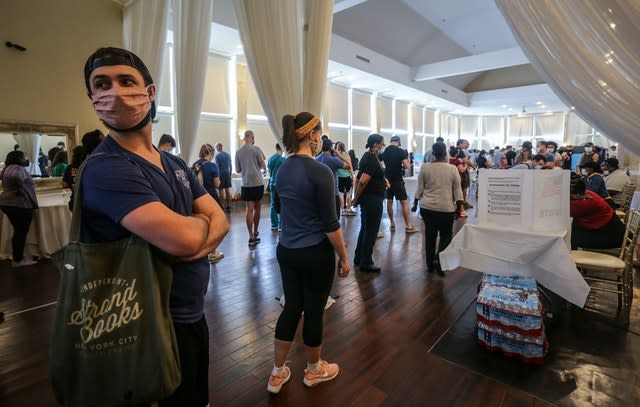Messy Georgia primary serves as warning for November
The long-standing wrangle over voting rights and election security in the US came to a head in Georgia on Tuesday in a messy state primary vote amid partisan finger-pointing from all sides.
The primary offered an unsettling preview of a November contest when battleground states could face potentially record turnouts.
Many Democrats blamed the Republican secretary of state for hours-long lines outside polling booths, voting machine malfunctions, provisional ballot shortages and absentee ballots failing to arrive in time.
Democrat Joe Biden’s presidential campaign called it “completely unacceptable”. Georgia Republicans deflected responsibility to metro Atlanta’s minority and Democratic-controlled counties, while President Donald Trump’s top campaign attorney decried “the chaos in Georgia”.
It raised the spectre of a worst-case November scenario: a decisive state, for example Florida, remaining in dispute long after polls close, as Mr Trump, Mr Biden and their supporters offer competing claims of victory, or question the election’s legitimacy, thus inflaming an already boiling electorate.

“I feel like we’re struggling as a country right now to hear people who really need to be heard,” said Atlanta resident Ross Wakefield, a 28-year-old white software engineer who waited nearly four hours to vote and watched others leave the line.
“This does not give me a lot of confidence that we’re doing that.”
At Mr Trump’s campaign headquarters, senior counsel Justin Clark blamed Georgia’s vote-by-mail push amid the Covid-19 pandemic, alluding to the president’s unfounded claims that absentee voting yields widespread fraud.
“The American people want to know that the results of an election accurately reflect the will of the voters,” Mr Clark said.
“The only way to make sure that the American people will have faith in the results is if people who can, show up and vote in person.”
Rachana Desai Martin, a top Biden campaign attorney, called the scenes in Georgia a “threat” to democracy.
“We only have a few months left until voters around the nation head to the polls again, and efforts should begin immediately to ensure that every Georgian — and every American — is able to safely exercise their right to vote,” she said.
Ms Martin stopped short of assigning blame, but two Georgia Democrats on Mr Biden’s list of potential running mates pointed at Republican Secretary of State Brad Raffensperger, who led the selection of Georgia’s new voting machine system and invited every active voter to request an absentee ballot.

Atlanta Mayor Keisha Lance Bottoms tweeted at Mr Raffensperger about problems in pockets of metro Atlanta.
“Is this happening across the county or just on the south end,” the Democrat asked, referring to an area with a heavily black population.
Stacey Abrams, the 2018 Democratic nominee for governor and an Atlanta resident, tweeted that “Georgians deserve better” and that Mr Raffensperger “owns this disaster”.
Ms Abrams established herself as a voting rights advocate after she refused to concede her 2018 race because of voting irregularities when her Republican opponent, the now governor Brian Kemp, was secretary of state.
Voting rights groups, including Ms Abrams’ Fair Fight Action, said Georgia’s experiences justify their efforts to combat what they describe as a coordinated GOP push to restrict ballot access. Fair Fight, Priorities USA and American Bridge earlier this week announced a “Voter Suppression Watch” partnership.
“Trump is already trying to extend this culture war by creating fear around vote-by-mail,” said Aneesa McMillan of the Priorities political action committee.
She noted the Republican National Committee’s plans to recruit thousands of poll watchers now that the GOP is no longer under a court order banning the practice that Democrats equate to voter intimidation.
“We have to learn our lessons, not just from Georgia, and protect the entire process,” Ms McMillan said.

